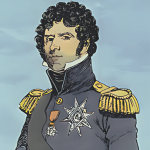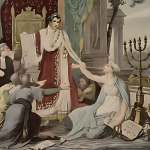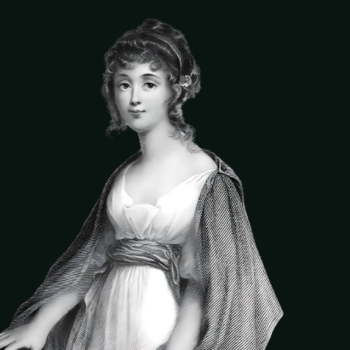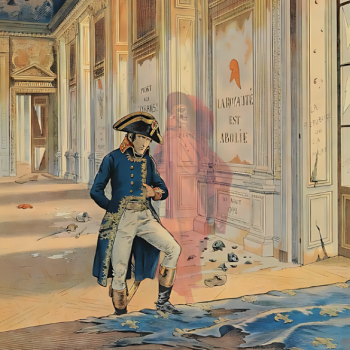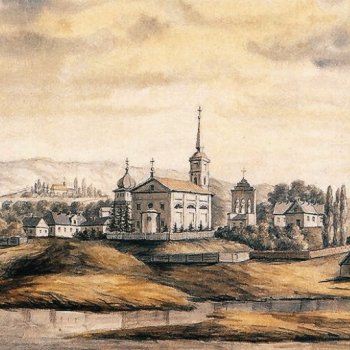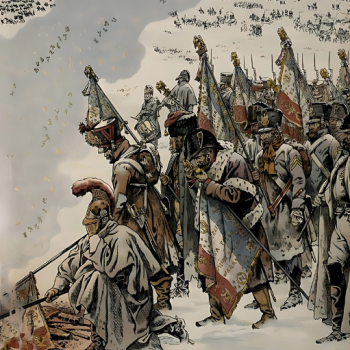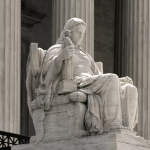A Tournament Of Shadows:
XI. The Emperor With An Iron Crown
In 1803 Napoleon implemented his new laws (the Napoleonic Code) upon the many lands under his control. In May 1804, he was finally crowned Emperor of France. Soon after Napoleon had been elected, Emperor Francis II of Austria entered into negotiations with him for the reciprocal acknowledgment of the new titles. Napoleon insisted upon being recognized first, and when that was done, Francis proclaimed himself hereditary Emperor of Austria in August 1804. Since the days of Pepin, the Popes of Rome had been accustomed to crown the emperors of the Holy Roman Empire, who usually went to Rome to receive the papal unction. Napoleon, however, determined to signal his unequaled predominance, drew the Pope to Paris to annoint him with the sacred oil.
With this unprecedented spectacle, and all the permanence which sacerdotal confirmation imparted, Napoleon at once made manifest his superiority over other monarchs of the earth. The ceremony of the coronation was performed in the Cathedral of Notre Dame on Sunday, December 2, 1804. Since the days of Otho the Great, the dignity of King of Italy had been attached to the imperial crown of Germany. Napoleon knew that he could not, without offending the House of Austria, assume a title that was regarded as the first sovereigns, and secular heads of Christendom, by the elective kings of the Romans. Yes, indeed he knew this, but such considerations were of little weight with him, and in March 1805 he declared to the French senate that he had accepted the Lombard crown. On May 26 he crowned himself with the iron crown of the old Lombard kings, pronouncing at the same time the accustomed words: “God gave it to me; woe to him who touches it.”[1] By this point, he had conquered Italy, Belgium, Holland, Switzerland, the Rhineland, the Duchy of Warsaw, Denmark, Norway, and most of Prussia and Austria.
Napoleon had no intention of conquering Russia, not yet at least, he was primarily concerned with subduing Britain. Russia, likewise, had no strong desire for conflict with the French. However, owing to former alliances with Prussia and Austria, in December 1805, Tsar Alexander Pavlovich was drawn into open warfare on the fields of Austerlitz with Emperor Francis.
“Tomorrow,” said Napoleon, “before nightfall. That army will be my own.”
He spent the whole day on horseback, encouraging his men, studying the capabilities of the ground, and formulating his plans. Wherever he appeared, he was met with the shouts: “Vive l’Empereur!” Night settled over the camp, and Napoleon was continuing his reconnoiter. A soldier suddenly seized a bundle of straw, attached it to his bayonet, lit it on fire, and swung the gleaming torch in the air. His example was followed by others. Soon the whole camp blazed with illuminations for miles. It was the first anniversary of Napoleon’s coronation as Emperor of France, and his men had not forgotten. The ruddy glow lit up the hills, while the shouts of “Vive l’Empereur!” filled all the valley and vibrated thunderously ominous through the tents of the allies. At four o’clock Napoleon was on horseback beside his tent, staring into the heavens. The moon had just gone down, but the stars were up. A sea of mist washed over the valleys below. Silence. Darkness and silence brooded over the sleeping hosts. Napoleon’s quick ear caught a low continuous sound beyond the heights of Pratzen, the heavy tread of marching columns, and the rumble of artillery carriages. The Allies were gathering their forces on his right wing, just as he anticipated. The bugles sounded. The French sprang from the frozen ground, officers and soldiers impatient for the fray.
The stars gradually disappeared. The sun rose slowly above the horizon, a golden ball of fire that would later be known as “The Sun of Austerlitz.” Napoleon’s marshals who stood around the emperor, saw that the allies, intent on outflanking the French, were weakening their center. The coalition of Russian, Austrian, and Prussian lines were stretched too thin at the center, and Napoleon only had to wait for the moment to strike. The French were burning with impatience, but Napoleon, turning to General Soult calmly asked: “How long would it take you to reach the heights of Pratzen?”
“Less than twenty minutes,” replied Soult. “My troops are in the bottom of the valley covered with mist and with the smoke of their bivouacs. The enemy cannot see them.”
“Then,” said Napoleon, “let us wait twenty minutes. When the enemy is making a false move, it is well not to interrupt him.”
It was now eight o’clock. The heavy booming of artillery announced that the Russians had begun a furious attack on the right. With untested belief in his capabilities as a military commander, Tsar Alexander Pavlovich overruled his top generals, and galloped to the front of the Russian armies, facing off against a formidable and exceedingly more experienced enemy. Constantine Pavlovich, the Tsar’s brother, led a reckless cavalry charge that nearly killed him.
“Now then,” cried Napoleon, “is the moment.”
Murat, Lannes, Bernadotte, and Soult were off like lightning to lead their respective corps. Napoleon clapped spurs to his steed, and as he reached the center, riding along the lines, he exclaimed: “Soldiers, the enemy has imprudently exposed himself to your attack. Finish the campaign with a clap of thunder.”
Soult meanwhile had emerged from the mist, and his battalions were storming the heights of Pratzen. Napoleon anxiously watched the splendid array. Upward streamed the living column, and in a moment the summit of Pratzen was covered with smoke. Thunder and lightning screamed from the clouds of war. When the tumult ceased, the sulfurous clouds lifted in the noonday sun. The center of the allies had been broken. The French standards waved on the heights. Soult burst on the left wing, while below Bessières was leading a charge of the Imperial Guard. Murat, Lannes, Davoust, and Augereau, were in the thick of the fray. The enemy’s left was borne away, and a loud shout announced the success of the French. A division of the Russian army was forced upon a frozen lake by Soult’s advance. The French halted at its edge and began a heavy fire of cannon, not on the Russians, but on the lake itself. The ice, burdened with men, horses, and guns, gave way at last, and in a moment the whole division was engulfed.
Napoleon directed a terrible onset on the right wing of the allies, and that too was vanquished. The Tsar himself was nearly captured, and the Russian Army was forced to retreat. This ended the Battle of Austerlitz, the most complete of all Napoleon’s victories. The loss of the allies was massive. Fifteen thousand Austrians and Russians were killed, and twenty thousand were made prisoners; forty standards were taken, and the whole Russian and Austrian parks of artillery fell into French hands.[2] Alexander Pavlovich, bitterly humiliated, returned to St. Petersburg in disgrace. Public reaction to the Tsar’s failure in battle soon turned hostile, and Alexander Pavlovich grew withdrawn and full of remorse.[3]
SOURCES:
[1] Heycock, Edwin. The Prophetical History Of The Church And The World. John Heywood. Manchester, England. (1872): 88-89.
[2] “Napoleon’s Marshals: II. Soult, The Hero Of Austerlitz.” The Illustrated American. Vol. VI, No. 54 (February 28, 1891): 97-101.
[3] Bennett, Richard E. 1820: Dawning Of The Restoration. Brigham Young University. Provo, Utah. (2020): 57‒80. [Chapter Three: “Tsar Alexander I: The King Of The North And His Holy Alliance.”]


